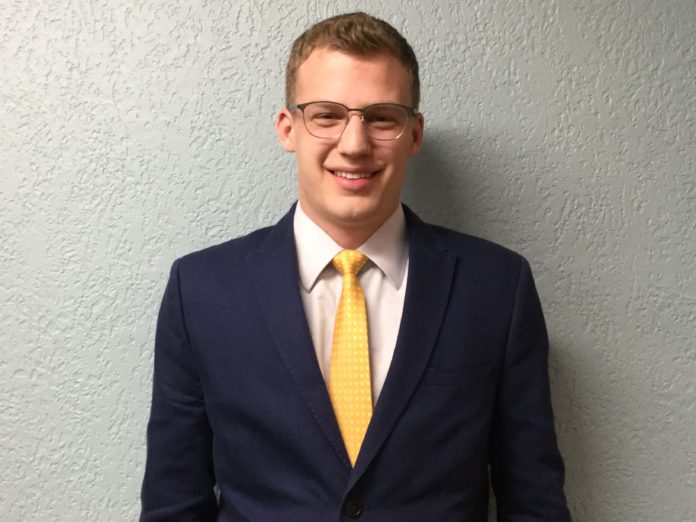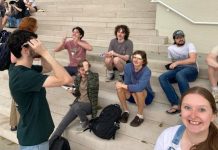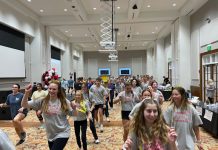Rambler Editor-in-Chief Tristan Reynolds interviewed Mark Sirianno, one of the candidates for the SGA Presidency. Read the full interview below, and read his interviews with the other candidates, as well as full Rambler coverage of the 2018 SGA Elections here.
The transcript has been lightly edited for clarity and readability.
Tristan Reynolds: What qualifies you to be SGA President?
Mark Sirianno: Absolutely, so I have served on SGA for three years, my whole time here at Transy; for my first year and half of my second year I was just a senator or representative. But for the past year and a half I have served as the Student Affairs Chair, so basically SGA is divided into two committees, Academic Affairs and Student Affairs. Student Affairs oversees everything to do with student life. The easiest way to talk about it is everything on the residential side of Broadway is Student Affairs and everything on the academic side of Broadway is Academic Affairs. That’s not exactly right, but that’s a kind of easy way to think about it. So I’ve spent a lot of time both as a senator and overseeing senators, overseeing projects. So as far as having an understanding of how the university works and having an understanding of how government works, I definitely feel qualified in that respect. Along with that, I’ve also been very involved with campus as a whole. I’ve served as an admissions ambassador, I’ve served as a First Engagement scholar, I’ve done research on campus, have joined numerous clubs and organizations, and I think that’s something that’s really helped me. I’ve actually tried to cut back on my involvement; I’m no longer a First Engagement scholar. I haven’t take any leadership roles in the organizations I’m currently involved with because I want to devote myself to SGA. Those other organizations and other jobs have shown me a lot of what needs to be done. I’ve gotten a lot of different perspectives. I’ve made a lot of great relationships with administration. I want to be the representative of the students. I don’t want to be biased by any of my relationships with other organizations; I don’t want to be biased with my relationships to administration. I want to be here for the students, I want to put the students first. So I think that’s what’s qualified me, as I’ve been on SGA for a long time, as long as it’s possible for me to have been, and I’ve been involved all over campus, but now I’m ready to devote all my attention to the students.
Tristan Reynolds: So you’ve been the chairman of the Student Affairs; would you characterize your tenure there as a success and on what grounds?
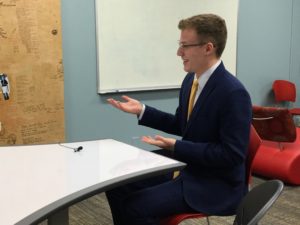
Mark Sirianno: Absolutely. So the easiest metric by which to judge Student Affairs or Academic Affairs is by projects completed. That’s not always representative of success, but it is representative of what we’ve been doing. So my first semester I was a little bit slow to get started; I had a little bit of trouble with making sure people were on task and getting stuff done. But this year we’ve completed well over 30 projects, some big, some small, some as small as just, you know, making sure there are markers and erasers for the whiteboard walls in the new dorms all the way up to trying to buy a $1,500 printer for Shearer art building, which should be coming soon; we’re very excited about that. There’s been a wide range of things, but we’ve gotten a lot done on student affairs. I’m very proud of that; I think the community’s been very successful, and we’ve had a good time doing it which is also important to me.
Tristan Reynolds: Moving on to nakedly political questions. Do you think you’re gonna win?
Mark Sirianno: I really don’t know. I hope to win obviously, but both Shelby and Jocelyn, my opposition, are both very good candidates. They’re both wonderful people, and I respect both of them a huge amount. I would love to be president; I do think I’m the most qualified, and I do think I will do the best job, but I can’t confidently say I will win or lose. You have three great candidates, and I really hope the students make their decision, and I’ll respect the decision they make.
Tristan Reynolds: Of the three great candidates, what distinguishes you in particular?
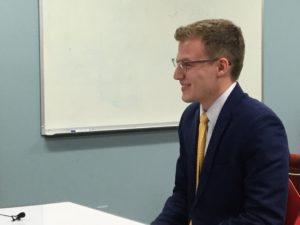
Mark Sirianno: Absolutely. On paper I have the most experience with leadership on SGA. I believe Shelby and I have been on SGA for the same amount of time, but I’ve taken on more leadership roles. I’ve been the Student Affairs Chair, so just purely SGA speaking, I have the most experience. Beyond that, I really do think it comes down to a commitment to your involvement on campus and where your loyalties are going to lie, and mine are without a doubt with student government and where I want to be. So I’ve been overly involved on campus, but I really have tried to dial that back so that I can just focus on that and just focus on the students, so that’s my goal. I have all the relationships; I’ve made relationships with administration, they all know me, I know all of them. I’ve made it my goal to try and know just about everyone in my class and the classes above, below me. So I think I’m both qualified by student government standards and by a just university as a whole involvement in standards, and more than anything I’m ready to put student government and the students first, moving forward.
Tristan Reynolds: Now to something more philosophy oriented… Are you satisfied with the way that SGA runs now?
Mark Sirianno: Yes and no. SGA is a very unique organization on campus; it struggles with a lot of different things. We always struggled to make sure that we try to be as representative as possible. That’s sometimes very difficult to do. We are getting stuff done, we have been quite successful, but I do think if I were elected president I would try and change a lot of things. More than anything, I would try and change our involvement. I think currently on campus there are a lot of decisions being made without student input which in some cases is very necessary and understandable. But in other cases a lot of conflicts could be avoided if simply a student voice were there to be made clear. One obvious example is recently there was an administrative decision to not allow summer housing for students on campus, and we kind of caught wind of that on SGA. After the decision had
been made, we were like, well, wait. Student housing on campus is something students really need; students were doing research, they have internships in Lexington. That’s something that you can’t take away, and we have voiced our opinion, and that decision has been changed; ideally that decision never would have been made. I think SGA has the platform to be involved in those decisions. We are the representation of the student body, and I think we should have been there when that original discussion occurred. SGA has become successful now, but I think they need to be a more integral part of all decisions made on campus. I don’t think the student voice can be heard enough; this university is for the students. It’s here for us to get an education, and without us they wouldn’t exist, and the more we get away from students being involved in decisions, the sooner this university will cease to exist. That’s something I really want to push for, to make sure that we are involved in those decisions, we as students, and I think SGA has a platform by which to do that.
Tristan Reynolds: Following up on that, the university has recently started it’s latest strategic planning process. How should students in SGA in particular be involved in that process?
Mark Sirianno: Absolutely. I mean, the university is trying, they’ve heard us, they want to get us involved and they’re having sessions open to students.
Tristan Reynolds: Are you satisfied with those sessions?
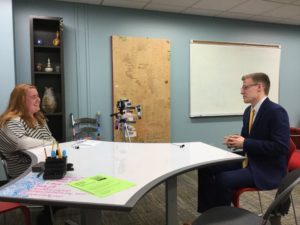
Mark Sirianno: I am and I’m not, I think that there needs to be more timing because a lot of times I’ve had class during them, or they’ve run late and I’ve had to leave early. Things like that have caused some issues, and their productivity (granted I haven’t been to all of them) is maybe questionable. I think student voice needs to be there, and that’s what we’re working towards, as long as that’s where the decision comes from. One worry I’ve always had is that they will have these strategic planning sessions and invite students to come so that they feel like their voices are heard, and then decisions will be made based on other criteria.
Tristan Reynolds: What action would you take as SGA president to ensure that that doesn’t happen?
Mark Sirianno: Mostly, so, we have these strategic planning meetings that are open to everyone, what happens after those strategic planning meetings is some of the officials take the results of that meeting and meet privately about what to do with the voices heard. I think it is in that scenario that a student representative needs to be there as well to make
sure information isn’t misinterpreted, misunderstood, to make sure that the issues that were brought up are actually being addressed opposed to just kind of hand waving over them. That of course may not always be possible, but I think the student representation should not just be when the university asks for it. I think the student representation should be all the time if that makes any sense. I don’t think it should just be in those settings
where we say, oh, come talk to us; I think it should be now we’ve heard you and we’re going to go make a decision based on what you said, and we’re going to have a student there when we make that decision as well.
Tristan Reynolds: As SGA president, what steps would you take to ensure that a student omnipresence is a priority for not only you but the Senate?

Mark Sirianno: So omnipresence is interesting; I don’t know if that’s ever attainable. Obviously that’s the goal, but I don’t know if that is a possibility. There will always be decisions made without student representation, budgetary things. Things like that, I think, are warranted to not have student representation necessarily involved with every step. However, it really just comes down to SGA has the framework there, the student government president already meets with the president of the university at least once every two weeks. That’s the standard, that’s normal. I would honestly try and increase that, maybe not just with the president but with other officials on campus, just to get a good grasp of what is going on. Even if I wouldn’t necessarily be involved with the meetings, I would just say, “Hey, what have you had meetings about? What is it that is on your plate as your role as an administrator?” Whether it be dean of students, anything like that. I think those meetings are very important and that’s something that I would try and make sure occurred. Again, the framework is there, the requirement for meetings is there, the availability for meetings. As student government president, you technically are supposed to be the representative for all of the students. I don’t think any administrator should ever tell you “no, I don’t want to meet with you” when they’re here for us, for the students, and that’s just something I would try and push very hard is to have those meetings to find out what decisions are being made, how they’re being made, and then from there say, OK, so next week you have a meeting about general education, something like that if I can’t be there, I’m going to send one of my senators who’s interested in that topic and just in general education, probably from the Academic Affairs committee, to go and sit in that meeting. Would that be all right? Can that happen? I’ll make sure they’re there and available and just really make sure that not just myself, but all the senators are getting involved with that. They can come back to full SGA and make a report about it. Just making sure that the administration knows we want to be involved and not necessarily forcing ourselves in, but making it clear that we want to be involved as well.
Tristan Reynolds: OK. I feel like we’ve touched on this, but I want to ask you the general question. What do you see as the proper relationship between SGA and the university’s
administration?

Mark Sirianno: The relationship can take a lot of forms; most of the time we are absolutely on the same team. We’re all here to further the university, we’re all here for the students to get an education both in the academics, the subjects we study, and also in life, and that should be our goal, and that is what unites us. That’s what unites the students and the administration is we have the same goal, and that doesn’t mean that any party should always win, there are definitely sides, like we can’t say, “oh, students want a a ferris wheel in Back Circle because that’d be fun” and expect the university to pay a whole bunch of money to get that done. That doesn’t make sense financially, and therefore the university should weigh in on that discussion. I do think that the student voice should be heard and should be put before most other considerations. Again, I talked a little bit about the decision to maybe not have housing for students on campus during the summer; I do believe that was probably a financially sound decision, and I think that would have saved the university money. However, I think it was to the detriment of the students. I think that it’s that kind of situation where the student voice should be made more clear and listened to. The relationship should always, ideally, be positive, and they should always agree and go for the same thing, but that’s obviously not always going to happen, so it needs to be a discussion; it may not always be a fun discussion, but there always needs to be discussion there.
Tristan Reynolds: Do you believe that as a general rule, the administration conducts those discussions in good faith?
Mark Sirianno: Yes I do. I think the administration tries very hard to have the students’ best interest in mind when they make decisions. I think a lot of times they may not have all the information; they may not really know what the students want or what they think is best for them. I do think the administration tries very hard to have the students best interest in mind. Does that always happen? No, absolutely not, but I do believe they try.
Tristan Reynolds: To finish up, I want to ask you a double question. If one of your opponents wins, do you believe that they will do the job to the best of their ability?

Mark Sirianno: I do. I think they will do the job to the best of their ability. Like I said, I have a lot of respect for both of the other candidates. I think they both bring unique attributes and unique ideas to the table, and I think they will try very hard. I think that I am better suited for the position; I think I can better accomplish the goals of the student body. I think I can better make sure the students’ needs and wants are addressed. I do believe that both candidates would work to the best of their ability; it’s just a matter of experience. It’s a matter of drive, and I think that’s kind of where I come through. I believe in the other two candidates; I think they’re great people, and I just believe I’m slightly better suited for the position as president.
Tristan Reynolds: Suppose you win, how would you conduct your relationship with your opponents, assuming they remain on SGA?
Mark Sirianno: I sincerely hope they do. As I said, they’ve both been wonderful senators. Actually, both of them are on the Student Affairs Committee, which I am the chair of. They’re both very productive; they both completed a fair amount of projects, and I would love to see them continue to do so. Obviously you can help this university from all different areas, from all different places, and I would love to see them continue on SGA. I would love to hear their ideas of what they wanted to do as president and maybe incorporate them if that’s something the student body would like. I suppose there is no one answer of what I think our relationship will be like because it’s not totally dependent on me, but I would hope that they would still be a contributing member, they’d still want the university to become the best place it could be, they’d still want to put students first, and I think our relationship could be great.
Tristan Reynolds: Thank you for your time.


